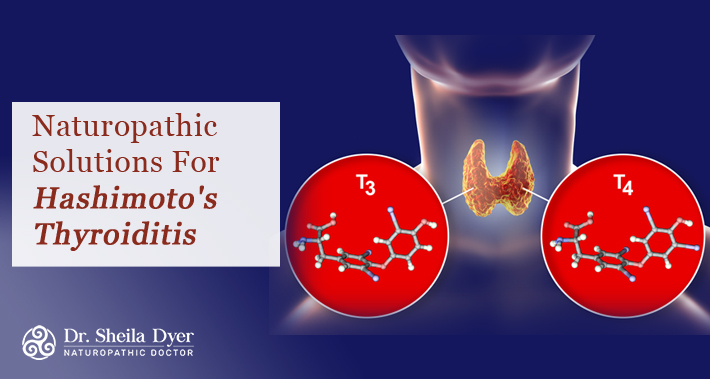The thyroid is a butterfly-shaped gland located at the front of the neck.
It’s responsible for creating many of the hormones used by your body, which control many of the body’s vital functions.
Due to this fact, when something impacts your thyroid hormone levels it can result in cascading effects on the rest of your body.
I’m Dr. Sheila Dyer, ND a naturopathic thyroid doctor in Toronto, and I want to help you ensure your thyroid health is in great shape, as it can impact everything else going on in your body.
Today we’re going to take a closer look at the symptoms of Hashimoto’s thyroiditis and some natural ways to manage this condition.
Keep reading to learn more.
What Is Hashimoto’s Thyroiditis?
Hashimoto’s thyroiditis is an autoimmune condition which affects the functioning of the thyroid.
It occurs when the white blood cells and immune system attack the cells of the thyroid, which creates a hormonal issue as your body doesn’t produce enough thyroid hormone.
It is one of the most common causes of hypothyroidism.
Symptoms Of Hashimoto’s Thyroiditis
Because Hashimoto’s thyroiditis is one of the causes of low thyroid function, its symptoms are the same as those of an underactive thyroid.
These include:
- Fertility issues
- Digestive health issues like constipation
- Heavy menstruation or painful periods
- Pale or dry skin
- Hair thinning
- Depression
- Intolerance to the cold
- Chronic fatigue and sluggishness
- Muscle weakness, especially in the lower body
- Goiter (swollen thyroid gland)
Causes & Risk Factors For Hashimoto’s Thyroiditis
There is not one known cause of Hashimoto’s thyroiditis, however there a number of factors which can result in increased risk of developing it.
Cisgender women are seven times more likely to develop it than men, and this is especially true for those individuals who are pregnant.
In addition, having a genetic predisposition to other autoimmune conditions can lead to increased risk, including family history of:
- Addison’s disease
- Graves; disease
- Vitiligo
- Diabetes
- Lupus
- Rheumatoid arthritis
- Sjögren’ssyndrome
Naturopathic Treatments For Hashimoto’s Thyroiditis
If you have low levels of thyroid hormones, there are a number of natural solutions you can use to help manage them.
In this section, we’ll look at a few of them.
1. Take Care Of Your Gut
Often, thyroid issues are due to poor diet, and not getting enough nutrients.
Even if you are eating well, if your body is unable to absorb the nutrients you’re taking in, it can lead to issues.
Taking care to address gut issues can include eating more probiotics, limiting sugars and starches, and if needed limiting foods which can cause inflammation.
2. Selenium
In an individual with Hashimoto’s thyroiditis, the immune system attacks the thyroid, and this can result in reduction of selenium, which is a trace element important to the function of the thyroid.
It can be found in a variety of foods, including:
- Grass-fed beef
- Brazil nuts
- Tuna
- Turkey
If you’re deficient in selenium your naturopathic doctor can help you to determine how much you need, and if supplementation would be beneficial.
Selenium has a number of other benefits as well, including as a naturopathic treatment for eczema
3. Reduce Your Sugar Intake
Eating too much sugar can cause inflammation, which can impact the function of your thyroid.
Additionally, although in the short term sugar can result in a temporary boost of energy, in the long term reducing or eliminating sugar can result in better regulation of energy levels.
Eliminating or reducing sugar can be difficult, but it can be extremely beneficial for your overall health, and not just your thyroid function.
4. Vitamin B12
If you are feeling fatigued due to thyroid disease, adding vitamin B12 to your diet may be beneficial.
Thyroid issues can result in lower levels of this important vitamin, and adding more to your diet, or using B12 supplements can help to mitigate some of the damage low thyroid levels can cause.
Some foods containing B12 include:
- Eggs
- Peas
- Beans
- Milk
- Tuna
- Cheese
- Sesame seeds
- Asparagus
5. Probiotics
Links have been found between issues with the small intestine and low thyroid levels.
Hypothyroidism can result in small intestinal bacterial overgrowth (SIBO), and symptoms such as diarrhea.
Supplementation with probiotics can help keep your gastrointestinal tract healthy, and improve the balance of “good” bacteria.
It’s important to note, though, if you do in fact have SIBO, probiotics can make your symptoms worse.
In addition to supplements, many fermented foods contain probiotics, including:
- Certain types of cheese
- Kefir
- Kombucha
- Kimchi
- Yogurt
- Sauerkraut
- Tempeh
- Miso
Book An Appointment With Dr. Sheila Dyer, ND, Today
Are you feeling tired and sluggish, and can’t figure out why?
Maybe you’re cold all the time, even when others are complaining about the heat?
Do you think you might have a thyroid condition?
Or perhaps you’ve already been diagnosed with a thyroid issues such as Hashimoto’s disease, and are looking for help with natural ways to control your condition.
I’m Dr. Sheila Dyer, ND, a naturopathic doctor in Toronto, and I’m here to help.
Contact me today to set up an appointment, and I’ll work with you to create a treatment plan to help keep you feeling your best.
If you have questions about naturopathic medicine, or would like to start with your first consultation, contact me, and let’s book an appointment.
Dr. Sheila Dyer, ND1080 Dovercourt Rd,
Toronto, ON M6H 2X8
(416) 554-5135
► https://g.page/DrSheilaDyerNd
Dr. Sheila Dyer is a Naturopathic Doctor and a practicing registered nurse offering holistic healthcare with a scientific focus

